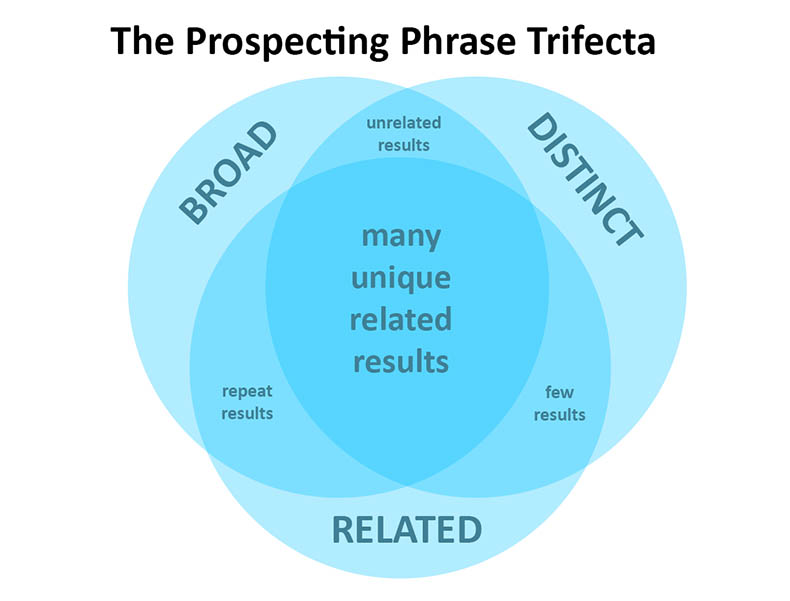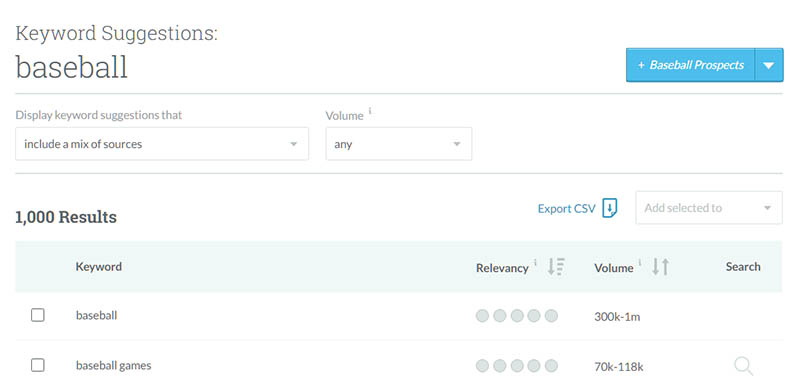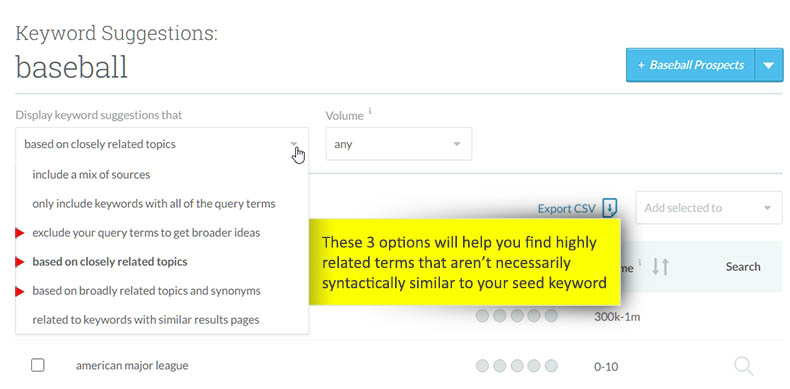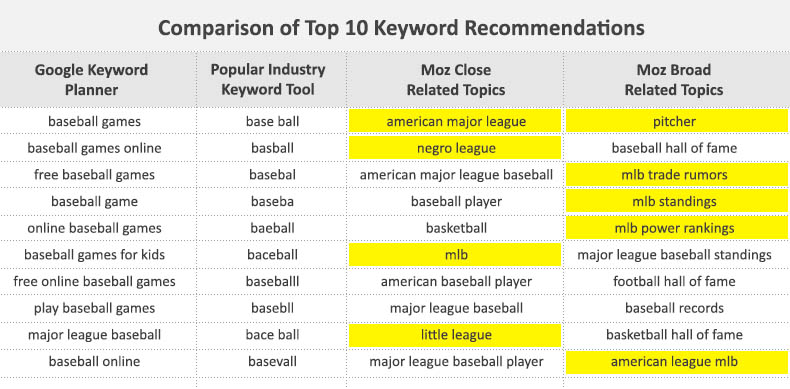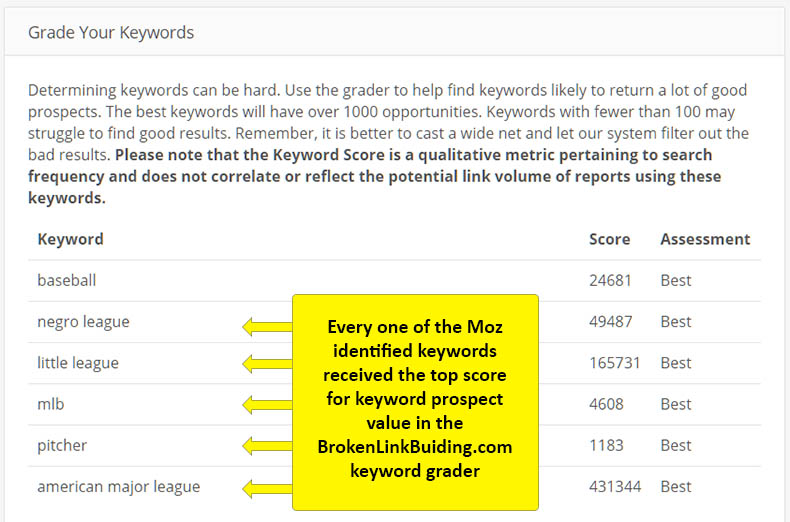Whenever a new tool is released, the first thing that comes into many SEOs’ minds is how can it help me get links? Certainly, the much anticipated release of Moz’s keyword tool was one of them, as finding good prospecting keywords is often essential for finding link building opportunities in tools like the Link Prospector or Broken Link Builder. Finding a good set of keywords is often harder than one might imagine, especially for prospecting.
Disclaimer: I work for Moz and helped with the creation of the Keyword Explorer tool used in this article. I think my statements here are true, but feel free to check me on them!
What Makes a Good Prospecting Keyword
When finding link opportunities, we have to consider the group of prospecting phrases together to determine the value of any of the constituent phrases. For example, the phrase “baseball” might be a good prospecting phrase, and so might the phrase “baseball game”. But you probably don’t need to prospect for “baseball game” if you already prospected for “baseball”m since there is a good chance your original search picked up most of the “baseball game” pages as well. The second phrase isn’t intrinsically a bad prospecting phrase, it is only bad in virtue of the other keywords already prospected. Thus, we have to look at the set as a whole for a certain pattern of characteristics. Here are a few that emerge as simple rules of thumb for a identifying strong prospecting phrases…
- Related: You don’t want to return results that are wholly unrelated to your target, but knowing how related it has to be can be a little difficult. You don’t want to be too similar or you will be prospecting your competitors, but you don’t want it to be too loose or you will have low conversion rates.
- Distinct: You don’t want your prospecting terms to return all the same results. “Baseball Game” and “Baseball Games” will return very similar results. Sure, they are both sufficiently related to the term “Baseball”, but they are similar. You also want to avoid derivative terms. “Baseball Games” derives from “Baseball Game”. If you had to choose only one, you would choose the root.
- Broad: You want to return a lot of results. Sure, targeting the keyword “online baseball games for the iphone” might be highly related and non-derivative, but it will only turn up a couple of prospects.
In building our keyword list, we want to make sure each of the terms meet these qualifications: Related, Distinct, and Broad. Keywords that meet all of these qualifications are gold.
Finding the Trifecta: Related and Distinct
Now here comes the hard part. There are tons of articles out there about keyword research and the myriad tools you can use to find the right terms or phrases. You are welcome to try any of those out, but I think you will find this new methodology pretty useful. The first step, historically, has been using any one of the standard keyword discovery tools out there to find related terms and phrases. Below is a screenshot of Moz’s Keyword Explorer. This probably looks familiar to you. Type in a keyword and get back related terms. But, if you remember, I already explained why a phrase like “baseball games” isn’t so good for prospecting related to “baseball” since there is such great overlap between the two phrases. So, what are we to do?
Well, unlike most other keyword tools, Moz gives us some options to identify the way keywords are related to one another, rather than just get a list based on whether the words like like each other. These semantic relationships can give us sufficiently related terms that are distinct from the seed. You will see in Keyword Explorer a couple of options for how to display keywords.
These 3 are my favorite for finding prospecting terms because they don’t return the same kinds of results that you normally find in keyword suggestion tools. These 3 are “exclude your query terms to get broader ideas”, “based on closely related topics” and “based on broadly related topics and synonyms”. Let’s do a side-by-side comparison to show how these results differ if you start with a keyword like “baseball”.
When we start with the keyword “baseball” in Google’s Keyword Planner, we get a lot of the same results that you would expect to see in a normal keyword tool. Notice that they all contain the word “baseball” in them, though. This is the problem with most keyword tools out there. They present just one class of related terms – derivative terms. Derivative terms are those which are built off the original term and are thus dependent upon them textually. The obvious issue with this is that when you prospect for “baseball”, you also find pages about “baseball games”. You get lots of overlap if you use derivative terms.
The next tool we looked at is, surprisingly, one of the leading keyword tools out there. The top 10 options for “baseball” are all just misspellings of the term. I’m just going assume we all know why this list isn’t particularly valuable and move on. Sure, with some work you can exclude certain phrases and end up with a good list using this tool. You can do the same with Keyword Planner. But good keywords aren’t immediately accessible.
Now, let’s look at Moz’s Keyword Explorer. I selected the closely and broadly related topics filters and then copied the top 10 right here. I didn’t cherry pick, so there are some that are admittedly not great. Football hall of fame is related to baseball, but not enough that we would want to use it. Basketball is related to baseball, but once again not enough that we would want to use it. But, in the top 10, roughly half of them meet 2 of the 3 qualifications for the trifecta, they are related and distinct (in that they do not contain the seed word “baseball”).
Finding the Trifecta: Broad
So, we have a good set now of related and distinct terms from Keyword Explorer, but are they broad? One easy way to test this is to use the Keyword Grader in the BrokenLinkBuilding.com prospector. The grader performs a quick set of tests to determine the likelihood that the keyword will return some good results. How do our keywords perform?
It makes sense that the keywords returned would perform well. Unlike derivative terms which get more and more specific, the topically related terms are broader in their very nature. They are closer to the “head tail” so-to-speak than the related terms provided by other tools. Thus, we now have some great keywords with which to begin prospecting.
Proof is in the Pudding
Our next step is to put these keywords to the test. I dropped them into the Link Prospector by Citation Labs and used the simple “Links Pages” finder for discovering opportunities for resource page link building. It is one of the oldest and simplest techniques for link building, and happens to be one of my favorite because it stands the test of time.
I hit submit and give it some time to run. I want to point something out here that is important. Because these keywords are related but distinct, you are likely to get more prospects than if you used related but not distinct. When it costs you 1 credit in a tool to run 5 keywords, it is definitely in your interest to use distinct phrases since they are more likely to lead to distinct opportunities. If we had used the phrases from Keyword Planner, we would have ended up with fewer results. In fact, the Moz keyword list produced 500 more prospects than the Keyword Planner list.
So, what kind of results do we get? Since we include the head term “baseball”, we get good opportunities like school team resource pages which would be great for articles on sports safety, but also pages that you would have totally missed with generic baseball phrases, like this EDU opportunity. With the right prospecting phrases, you can find unique, related opportunities that will drive link growth.
Completing the Trifecta.
When all is said and done, you still have to create the great content that will attract links from these resources, but when the keyword research part and the prospecting part are made easy by tools, you can actually discover the opportunities before you write the content. This is perhaps the most important shift now that the process of finding opportunities is simplified. You can and should start writing opportunity-oriented content, content you know can and will garner links because they are directed towards topics to which people are interested in linking.
